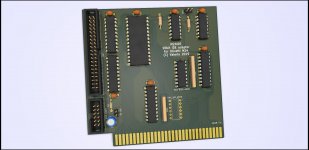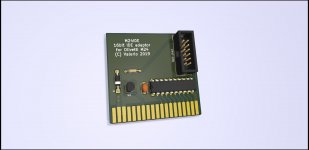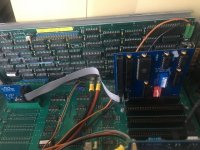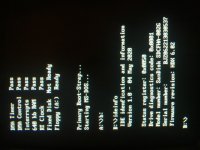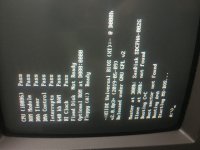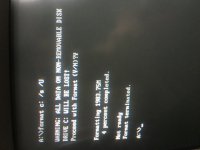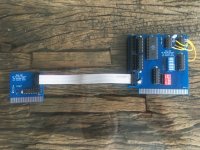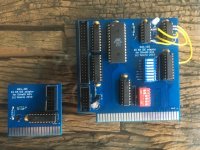Valerio
Experienced Member
Hello again -
As I mentioned my newly-acquired AT&T 6300 is missing a hard drive. I have glitchworks's XT-IDE in my Italian Olivetti M24 and it works flawlessly, so I could just get another one. But I've always wondered if it would be possible to remove the latches and have the IDE device communicate with the M24 through a full 16bit-wide data path? After all that's what an 8086 distinguishes itself for!
So I have spent a bit of time looking at the bus converter schematics (*) and the sequence of signals on the proprietary Olivetti 16-bit bus connector, and I can see no obvious reason why it should not work.
Olivetti 16-bit data transfers seem to work very similarly to their ISA counterparts, ie an address is presented on the bus, and if the card asserts a specific line (/IOCS16 in ISA, /16BCH in Olivetti) then a 16-bit transfer takes place. There are differences - in the Olivetti case, during a 16-bit transfer cycle the ISA-compatible command lines (/IOR, /IOW, /MEMR, /MEMW) are disabled and alternative Olivetti lines on the 16-bit connector are used (/XIOR, /XIOW, etc).
With this knowledge, I sketched a possible, simple interface, essentially a simplification of glitch's design split into two boards: a main one that plugs into the ISA-compatible 8-bit slot, and a smaller one that plugs into the Olivetti 16-bit slot. The two would be connected via a short 12-pin ribbon cable.
I have not breadborded or tested this at all - my ISA breadboard card is old and cranky, and with this many connections user error or breadboard malfunction would be virtually guaranteed. Also, at $5 a pop for professionally-fabricated prototype PCBs I'm willing to just have a board made with a reasonable starting design and then just debug that. (**)
So my question is... does anyone see any glaring flaws with my schematic, or any obvious reason why the whole thing would not work?
(*) The bus converter schematics in the Theory of Operation manual does not exactly match mine - probably a different revision. I have a hand-corrected version if anyone is interested.
(**) I have also not finished routing it yet. It's a lot more complicated than I thought or, most likely, I'm not very good at it.
(***) Sorry for the zipped version - I know it's not smaller than the .pdf, but the forum won't allow me to upload .pdf's larger than 48kb...
As I mentioned my newly-acquired AT&T 6300 is missing a hard drive. I have glitchworks's XT-IDE in my Italian Olivetti M24 and it works flawlessly, so I could just get another one. But I've always wondered if it would be possible to remove the latches and have the IDE device communicate with the M24 through a full 16bit-wide data path? After all that's what an 8086 distinguishes itself for!
So I have spent a bit of time looking at the bus converter schematics (*) and the sequence of signals on the proprietary Olivetti 16-bit bus connector, and I can see no obvious reason why it should not work.
Olivetti 16-bit data transfers seem to work very similarly to their ISA counterparts, ie an address is presented on the bus, and if the card asserts a specific line (/IOCS16 in ISA, /16BCH in Olivetti) then a 16-bit transfer takes place. There are differences - in the Olivetti case, during a 16-bit transfer cycle the ISA-compatible command lines (/IOR, /IOW, /MEMR, /MEMW) are disabled and alternative Olivetti lines on the 16-bit connector are used (/XIOR, /XIOW, etc).
With this knowledge, I sketched a possible, simple interface, essentially a simplification of glitch's design split into two boards: a main one that plugs into the ISA-compatible 8-bit slot, and a smaller one that plugs into the Olivetti 16-bit slot. The two would be connected via a short 12-pin ribbon cable.
I have not breadborded or tested this at all - my ISA breadboard card is old and cranky, and with this many connections user error or breadboard malfunction would be virtually guaranteed. Also, at $5 a pop for professionally-fabricated prototype PCBs I'm willing to just have a board made with a reasonable starting design and then just debug that. (**)
So my question is... does anyone see any glaring flaws with my schematic, or any obvious reason why the whole thing would not work?
(*) The bus converter schematics in the Theory of Operation manual does not exactly match mine - probably a different revision. I have a hand-corrected version if anyone is interested.
(**) I have also not finished routing it yet. It's a lot more complicated than I thought or, most likely, I'm not very good at it.
(***) Sorry for the zipped version - I know it's not smaller than the .pdf, but the forum won't allow me to upload .pdf's larger than 48kb...

